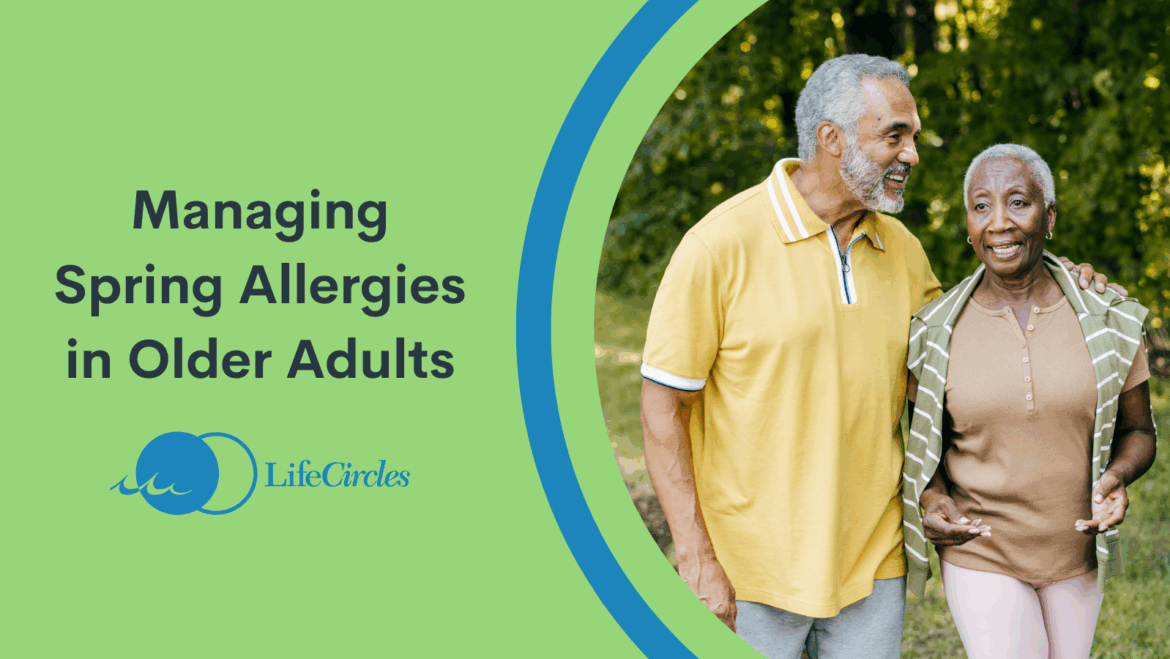Spring is a beautiful time of year, but for many older adults, it also brings seasonal allergies that can cause discomfort and health concerns. As trees and flowers bloom, pollen counts rise, making it difficult for those with allergies—especially those with respiratory issues—to enjoy the season. LifeCircles can play a crucial role in helping older adults manage allergies and stay comfortable during this time of year.
Common Allergy Symptoms in Older Adults
Seasonal allergies in older adults can sometimes be mistaken for colds or other respiratory conditions. Here are some key symptoms to watch for:
- Sneezing and runny nose
- Itchy or watery eyes
- Nasal congestion
- Itchy or horse throat
- Coughing or wheezing
- Shortness of breath (especially in those with asthma or COPD)
- Fatigue or general discomfort
For those with existing respiratory conditions, allergies can worsen symptoms, making proper management essential. The best way to combat the effects of this season is to minimize exposure to allergens. Here are some effective strategies to consider.
Monitor Pollen Counts
Did you know you can monitor the proliferation of pollen through the National Allergy Map. Similar to checking the weather, a quick pollen check can help you plan out your day to avoid highly concentrated allergens in the air. For higher pollen days, consider indoor activities and limit extended times in open outdoor spaces. A good rule of thumb to go by is if you’re sensitive to pollen and still are planning to venture outside, consider going in the morning or early afternoon when pollen levels are lower. They specify that from 4:00 AM to noon is the lowest pollen concentration in the air. After a warm day, as the air cools, pollen grains drift back down to the ground in a phenomenon known as a pollen shower. This explains why you may experience an allergy attack in the evening, as well as in the middle of the night.
Keep Indoor Air Clean
On windy days, it’s important to keep windows and doors closed to prevent pollen from getting in the home and residing there. Consider using an air purifier with a HEPA filter to reduce allergens indoors. This type of air filter can theoretically remove at least 99.97% of dust, pollen, mold, bacteria, and any airborne particles and is often a good investment for those who struggle with allergies. Another good reminder is to frequently wash sheets and drapes. Fabrics can make the perfect nesting ground for pollen, so changing the bedding of the clothes you’re wearing can also limit exposure to circulating pollen.
Choose the Right Medications
It might come to the point where medication is necessary to prevent worsening symptoms from allergies. The in-home healthcare provided by LifeCircles is one-way medication can be prescribed. LifeCircles participants can consult with an in-home physician about the need for allergy medications. It’s important to consult with a medical professional prior to taking an allergy medication, as some over-the-counter antihistamines may cause drowsiness or interact with other medications. What often can be prescribed to offer comfort during allergy season are nasal sprays and eye drops to minimize allergy side effects.
How LifeCircles Can Help Seniors Stay Comfortable
LifeCircles can play a vital role in managing seasonal allergies for seniors. Whether it’s helping keep the home dust and allergen-free or offering in-home health care to prevent allergen exposure, LifeCircles can help. Spring allergies don’t have to take the joy out of the season, especially after a long winter. By reducing exposure, maintaining a clean environment, and providing the right support, LifeCircles will help you or a loved one stay comfortable and enjoy the beauty of spring.
Last Updated on April 30, 2025
